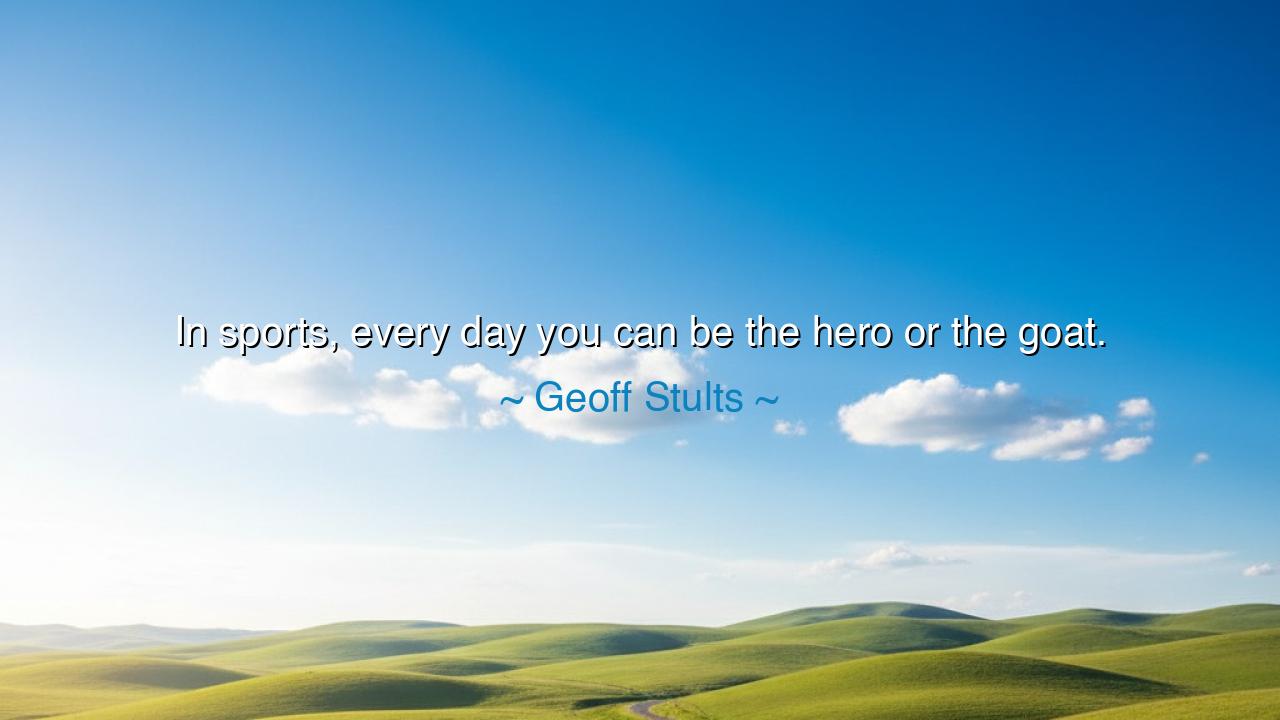
In sports, every day you can be the hero or the goat.






Geoff Stults, in a moment of clarity about the harsh yet noble reality of competition, once said: “In sports, every day you can be the hero or the goat.” At first, his words may seem light, even humorous, but they carry the weight of ancient truth: that the line between glory and shame is thin, and it is crossed anew each time an athlete steps into the arena. In sport, triumph and failure are never far apart, and every day offers the chance to ascend to the heights of greatness—or to fall into the depths of ridicule.
For the hero is the one whose actions shine with brilliance in the decisive moment. He makes the shot, breaks the record, secures the victory. The crowd roars, and his name is written in memory. The goat, by contrast, is the one whose mistake overshadows all else—the missed kick, the dropped ball, the stumble at the finish line. The same stage that exalts one man in the morning may cast another into scorn by evening. This duality is the essence of sport: it is not predictable, it is not kind, and it asks of every competitor both courage and humility.
History resounds with such examples. Recall Bill Buckner in the 1986 World Series. For years he was a respected hitter, a hard worker, a professional. But in one fateful moment, when a ground ball slipped through his legs, he was marked as the “goat.” His mistake became legend. Yet even this story carries deeper wisdom: Buckner was not defined by one play alone, though the world tried to brand him so. The lesson of his life was resilience, the courage to endure the weight of failure while continuing to live with dignity.
And yet, in the same breath, think of Michael Jordan, who time and again seized the final moment to rise as hero. The buzzer-beaters, the championships, the relentless will—all carved him into legend. But Jordan himself admitted he had missed thousands of shots in his career, failed over and over. What separated him was not perfection but the willingness to keep stepping into the arena, knowing each day he might be the hero or the goat. That, indeed, is the heart of Stults’ quote: the constant willingness to risk both extremes.
The ancients too understood this balance. The gladiator who entered the Roman arena faced the same fate: to walk out as victor, bathed in glory, or to fall in defeat, scorned and forgotten. Even in the Olympic Games of Greece, a single false start, a stumble, a misstep could turn a champion into a fool. Yet they competed anyway, because they knew that the greatness of life is not in avoiding shame but in daring for glory despite it.
The lesson for us is clear: in life, as in sports, every day we step into an arena. We may be praised, or we may be mocked. We may win, or we may lose. But the true shame lies not in being the goat—it lies in refusing to play, in fleeing from the risk of failure. To risk failure is the only way to earn triumph. To endure shame is the only way to taste glory.
Therefore, let Stults’ words be a reminder: embrace the uncertainty. Do not hide from the chance of failure, for it is the shadow that gives meaning to success. Step boldly into the arena of your life—at work, in love, in every endeavor. You may not always be the hero, but if you continue to strive, neither will you always be the goat. And in the end, the ones remembered are not those who played it safe, but those who dared, every day, to face both possibilities.
For in the eternal rhythm of competition, hero and goat are but two sides of the same coin—and the true measure of greatness lies in the courage to flip it, again and again, without fear.






AAdministratorAdministrator
Welcome, honored guests. Please leave a comment, we will respond soon